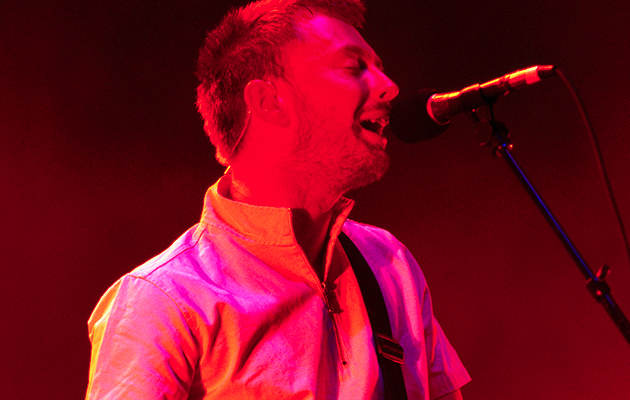In Britain, “My Iron Lung” made Number 24 despite no Radio 1 airplay. Britpop was hitting its cheery, inward-looking, London-centric peak and Radiohead’s murky gravitas seemed once more out of step with the national mood.
Even so, Radiohead’s next single, “High And Dry”, landed at Number 17 in March 1995. Then their second album, The Bends, entered the chart at six. This dark masterpiece was a massive leap forward from Pablo Honey. Beyond the typically fraught, lurching guitar anthems it boasted grace and grandeur, epic soundtracks and programmed rhythms. The title track was widely interpreted as an acerbic commentary on the disorienting effects of sudden fame. In fact, it had been written long before “Creep”.
Yorke claimed his voice was now “just another instrument rather than me personally giving you everything in my soul. You do that once and you never ever want to do it again.” Only later would he admit that The Bends was “an incredibly personal album, which is why I spent most of my time denying that it was personal at all.”
Lyrically, Jonny Greenwood claimed The Bends was about “illness and doctors… revulsion about our own bodies”. The album’s cover image, adapted by Yorke from hospital snapshots, seemed to reflect this theme. “I was a sickly child,” he told reporters. “The content of my lyrics shows that I am almost obsessed with my health. If I get ill on tour, it really does something to me emotionally.”
The album’s air of sickness haunted Radiohead. After suffering sharp head pains, Jonny began wearing protective headphones during concerts. This was on top of the splint he had taken to strapping on his right hand to counteract repetitive strain injury. Yorke was also obliged to plug his ears after they began filling with fluid due to the constant pressure changes of air travel.
The Bends barely dented the US charts despite a year of almost constant touring. Yorke’s fragile state grew worse on the US tour, where Radiohead were “living through pure fucking hell” on three hours of sleep a night. Before a New York show in May, the singer suffered “a complete breakdown” and begged tour manager Tom Greaves to book him on the next flight home. He was talked into staying by his fellow band members, a testament to the brittle new mood of unity within Radiohead.
Radiohead’s future direction was also beginning to take shape in Yorke’s mind. “I get really envious when I hear good jungle or stuff on Warp or the Tricky album,” the singer told NME in May. “I get this sense that they were made in isolation and that there wasn’t this need to be in a bollocks rock band.” Prophetic words.
A prestigious summer tour supporting longtime idols R.E.M. showed Radiohead a more positive way to deal with fame. Meeting Stipe, Yorke says, taught him that “it is possible to do more than two albums, and to like the idea of sticking around. Learning to forget how you did something and not trying to compete with yourself. It’s a cool thing, just learning to not have to fight and argue with yourself all the time.”
But Radiohead’s idyllic summer evaporated into frustration again as they toured The Bends to a largely indifferent America in late 1995. During an October jaunt with Soul Asylum, all the band’s equipment was stolen in Denver. Later, in Vancouver, Yorke interrupted the show to silence a table of chattering industry types. “We’ve gone all around the world on this tour,” he raged, “and you are the rudest fuckers we have ever met.”
Radiohead’s recurring ill health caught up with them again in Munich in late November. A sick Yorke tried to cancel a show, but the promoter called a doctor who pronounced the singer fit for action. On stage, a clearly disturbed Yorke blew a fuse before blacking out and collapsing.
“I just got really fucking freaked out,” he said later. “I got tunnel vision, I didn’t know what happened. I threw stuff around and threw my amp around and the drum kit and ended up with blood all over my face. I cried for about two hours afterwards.”
This incident was labelled “Thommy’s Temper Tantrum” by the NME in a short, innocuous news story. The singer claimed, “I’m sure the NME don’t give a fuck, but what they wrote in that piece hurt me more than anything else anyone has ever written about me.” He then froze the paper out of interviews for over five years. ‘Forgive and forget’ is not Thom Yorke’s motto.
“When things get personal,” he says, “when you’re a moving target, once you’ve had to deal with that, you find it very difficult to forgive and forget.”



